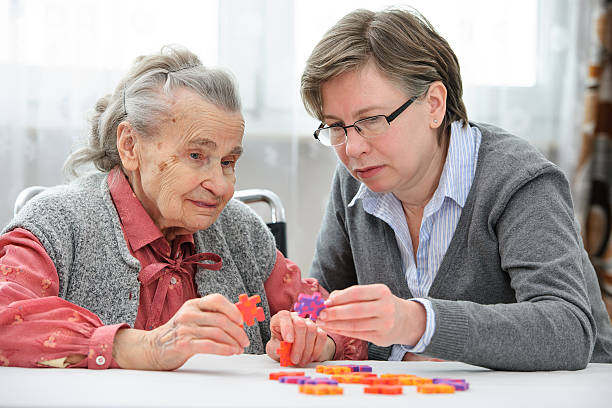What To Know When Caring For Someone With Dementia
Dementia is an insidious disease. It can destroy the very fabric of someone’s humanity, stealing away their personality, memories, and dignity. If a spouse, family member or friend has dementia, it is important to understand the various stages of the disease and the types of care that will be required.
Understanding Dementia
Dementia is the loss of the ability to think, reason, and remember to a level that makes it difficult if not impossible to perform essential daily living tasks. It affects millions of people worldwide and is more common in older adults. Medical researchers estimate that about one-third of people aged 85 and older experience some form of dementia. While there are many different types of dementia, Alzheimer’s Disease is the most common, accounting for 60-70% of the cases diagnosed.
Dementia affects each person differently. The types and severity of symptoms can vary greatly but there are generally three stages used to classify the illness – early, middle, and late or mild, moderate, and severe. Dementia is also a progressive illness which means that regardless of what stage a person is in when diagnosed, it will become increasingly severe because there is currently no cure.
Caring for someone with dementia can be challenging and stressful but with the right planning, education, and support, you will be able to keep your loved one safe and comfortable at home for as long as possible.
Strategies For Dementia Care
Caring for someone with dementia can be challenging and even overwhelming at times, especially if the primary caregivers are family members or friends. No matter how difficult it may seem, there is help and support available for people with dementia and those taking care of them. Here is some helpful information and tips everyone should know when dealing with dementia:
• Dementia care coordinators are an excellent resource for family members and caregivers. They can provide an assessment of the home and living situation that will identify safety concerns and any needs for medical and other types of support required in the short and long term. To find a dementia care coordinator in your community, contact your health care provider for referral source information.
• People with dementia will eventually be unable to make responsible health care decisions for themselves. Part of the advance care planning process should be contacting an elder care lawyer to establish a living will and durable power-of-attorney. Having a legal framework in place as early as possible can help minimize friction in the family when critical decisions become necessary regarding health care and financial matters.
• Designating caregiving responsibilities will require thoughtful planning. A person with dementia will need help with grocery shopping, medication management, cooking, cleaning, personal care, bill paying and much more. In most cases, the ability to provide all the support necessary is beyond the capabilities of any one family member, so having others to assist when needed is essential to your loved one’s well-being. Contacting a home care agency with dementia experience is recommended to ensure there will never be a lapse in care.
• When dementia progresses to a point that in-home care is no longer possible, there are various assisted living and memory care communities that families can consider as alternatives. Dementia care of this type can be costly with the average nationwide being about $6,000 per month. Residents of these communities pay in a variety of ways, including long-term insurance, personal savings, and government assistance programs like Medicaid or veteran’s benefits. Once again, evaluating a loved one’s coverage plans and financial resources as early as possible is a smart way to identify potential problems before they become more serious issues.
• Utilize assisted devices as needed around the home. Wheelchairs, walkers, canes, and grab bars in bathrooms are just some of the devices that can help a person with dementia avoid injuries that can send them to emergency rooms or nursing homes. It is estimated that about 90 percent of dementia patients’ needs are safety related, so be proactive about injury prevention.
• Practice self-care. Being a caretaker for someone with dementia can stretch your physical and mental limits. Don’t hesitate to give yourself a break when it is needed. Getting relief help when necessary from family members, friends or professional caregivers will help ensure the well-being of you and your loved one.
One of the symptoms of dementia is the diminishing of a person’s ability to express themselves, so learning how to communicate with them especially during unpredictable mood swings is important. Learning new ways to communicate verbally and non-verbally will enable you to optimize your caregiving capabilities.
Dementia care can be difficult but also extremely rewarding. Even though the person you are caring for may not be able to express their gratitude, you can find comfort knowing that you are truly making a wonderful difference in someone’s life.


Leave a Reply
You must be logged in to post a comment.